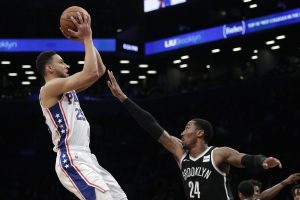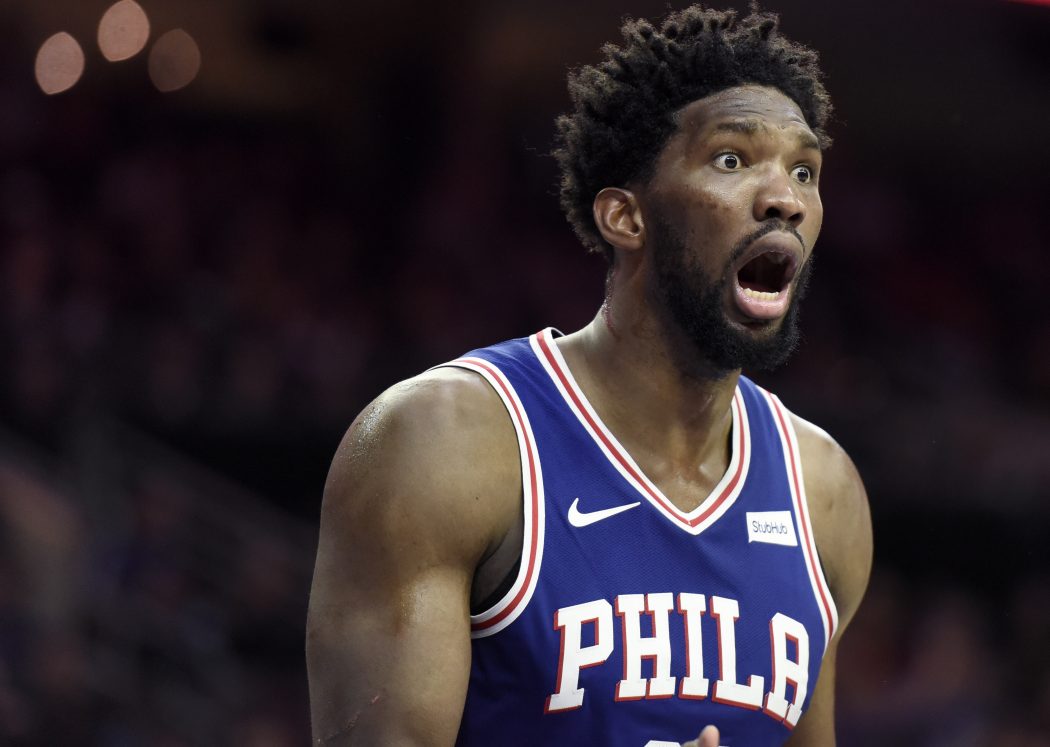How the 76ers Fell a Jump Shot Away From a Dynasty
It’s Monday night in Miami, Florida, and 76er guard Markelle Fultz stands at the free throw line ready to shoot his second foul shot. It’s a tight game, middle of the second quarter–something he’s done countless times from his tenure at Dematha Catholic to his brief stint at the University of Washington.
The game is being played on the newly varnished “Miami Vice” court in the American Airlines Arena. The venue is immaculate, and its beauty stands in stark contrast to what transpires next.
The ball rims off the back iron. And, since Fultz is a career 53.4% free throw shooter, that’s not the surprising part. It’s not the part which makes the watching spectators screw up their faces, or causes NBA twitter to lose its mind, or makes the whole of Philadelphia to groan in despair.
In a city which watched Shaq shoot free throws for four years, Miami fans may just have witnessed a new low at the charity stripe.
Fultz pump-faked at the FT line
pic.twitter.com/tSqWL6F7fY
— Bleacher Report (@BleacherReport) November 13, 2018
A pump-fake free throw?
Fultz later claimed that the ball simply slipped out of his hands. And indeed, the now infamous shot form seems to be a thing of the past, but Fultz has simply moved onto yet another new unorthodox free throw routine which, albeit better, is still, well, weird.
The latest from Markelle Fultz at the FT line: pic.twitter.com/OJZPKEfvf1
— SportsCenter (@SportsCenter) November 17, 2018
This is not who Markelle Fultz was supposed to be. Heading into the 2018 NBA season as the latest No. 1 pick in the NBA– one that the 76ers gave their own third overall draft pick and an unprotected first in 2019 to acquire–expectations were high for the UW product. Expectations which have fallen flat, just like many of Fultz’s jump shots over the past two seasons.
Things were strange from the beginning of Fultz’s young career in the City of Brotherly Love. He appeared in only the first four games of the 2017-18 campaign before being placed on IR for an enigmatic shoulder injury which has since only become more and more puzzling.
He would play only 10 more games in all of last season, and in those contests he saw a heavily reduced role as compared to his rookie counterparts Jayson Tatum and Donovan Mitchell, both of whom excelled and led their respective teams to playoff success with Tatum’s Celtics actually beating Fultz’s 76ers to advance to the Eastern Conference Finals.
Fultz was granted a starting spot to begin this 2019 season, but his numbers haven’t justified the promotion–as the 76ers’ plus/minus with him on and off the floor manifests that the team is significantly better with him sitting. The primary problem in Fultz’s game is still his jumper, which is nowhere near where it was during his time at UW–where he shot 41.3% from three– and still features an awkward hitch. He’s shooting a ghastly 26.8% from three on the current season, which allows defenders to routinely cheat off him and, in turn, closes driving and passing lanes.
This issue is only compounded by the 76ers dire lack of outside shooting and is one of the main reasons Fultz lost his starting spot to sharp-shooting role player JJ Reddick earlier this month and now is seeking additional medical opinions on his ostensibly still lingering shoulder injury.
 Mark Lennihan/AP Photo
Mark Lennihan/AP Photo There is no immediate fix to a problem which has now dragged on for over a year, and Fultz’s continued shooting woes have led some to question his mental fortitude. The 76ers are also reportedly tired of the circus, and are considering dealing him at a time where his value is at an all time low–the ultimate evidence of their impatience. The team clearly wants to win championships now, and their greed for jewelry led them to make a trade for 29-year-old All-Star Jimmy Butler on Nov. 12, and in return shipped Dario Saric and Robert Covington–who are both under 25 and were two of their best shooters– to Minnesota. The 76ers bet on talent instead of fit, choosing to satiate their title aspirations now instead of waiting. For now, it’s working, as the team has won six of their past eight games with Butler on the roster.
The problem with their win-now mindset, however, is that even with the addition of Butler, they are still light years behind the Golden State Warriors, and perhaps still too, lagging behind in-conference rivals the Boston Celtics and Toronto Raptors.
Their triple-headed core of Ben Simmons, Joel Embiid and now Jimmy Butler is promising, but any basketball fan knows that Steph Curry, Klay Thompson, Kevin Durant, Draymond Green and Demarcus Cousins is still better. Much better.
This season is a wrap for Philly (and the rest of the NBA for that matter.) But the Warriors appear to be hurtling towards an inexorable break-up next offseason where Durant, Thompson and Cousins are all slated to become unrestricted free agents. Realistically, Durant and Cousins are both probably on new teams come the 2020 season-opener.
This should have put the 76ers in title contention for the next decade. Instead, they were forced to settle for a reduced championship window, one which realistically stretches maybe two or three more seasons. At 29, Butler simply isn’t on the timeline that his two other superstar counterparts are, and his prime is nearly up. In an NBA where a team needs three stars to win a championship (four is even better), one of Philly’s will cease to be such within the next five seasons.
Maybe Philadelphia should have waited and developed Fultz more gradually, allowing him time to recover and rediscover himself and his jumper. Or perhaps they should have kept their young assets, waiting for a younger star which suited their needs and timeline better to hit the market (hi, Bradley). Who knows? Instead, they played the short game, and the 76ers will most likely have to wait a good while longer to raise their fourth banner.
But truly, most of their current predicament isn’t the 76ers fault. Fultz looked like a panacea for all their ailments coming out of college: a guard who could take over in the clutch with all the offensive tools necessary to be a superstar to complement their other two.
The Sixers could have been a dynasty; instead, we will remember them as perpetual second-round exiters, the new LeBronto Raptors, who traded away a draft pick to an intra-conference rival which would become Jayson Tatum, and then picked a guy who could have been great but whose only flaw was that he couldn’t shoot (no, the other one, not Ben.)
They were a jump shot away.
Even though Philadelphia is watching their team play its best basketball in years, it’s becoming increasingly difficult to “trust the process.”

